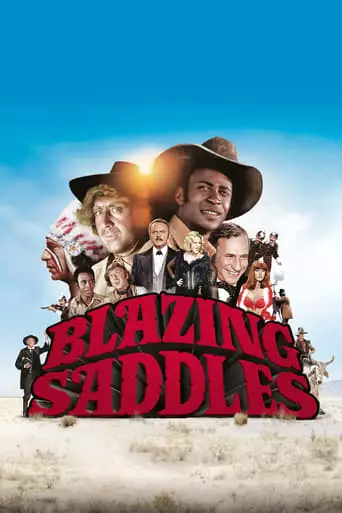
Blazing Saddles (1974) Watch Online Free
A town—where everyone seems to be named Johnson—stands in the way of the railroad. In order to grab their land, robber baron Hedley Lamarr sends his henchmen to make life in the town unbearable. After the sheriff is killed, the town demands a new sheriff from the Governor, so Hedley convinces him to send the town the first black sheriff in the west.
Blazing Saddles (1974), directed by Mel Brooks, is a satirical Western comedy that challenges and lampoons the iconic genre of the American Western film. The plot follows Bart (Cleavon Little), a Black man who is appointed as the sheriff of the small town of Rock Ridge in a cynical move by the villainous Hedley Lamarr (Harvey Korman), who hopes the racially charged appointment will provoke the townspeople into violence and force them to abandon the land he wants to seize. However, Bart’s presence has the opposite effect: he becomes the town’s hero, outsmarting both Lamarr and his corrupt henchmen in an increasingly absurd series of events.
The film opens with the construction of a railroad track being diverted through Rock Ridge, a town threatened by quicksand, corruption, and greed. To drive out the town’s residents, Lamarr appoints Bart as the sheriff, expecting it to ignite racial tensions. Instead, Bart, supported by a ragtag group of allies including the Waco Kid (Gene Wilder), subverts the town’s prejudice and helps the citizens resist Lamarr’s malicious plans. The film ultimately sees Bart triumphing in a climactic, over-the-top battle involving gunfights, pranks, and absurd antics.
“Blazing Saddles” is layered with sharp social commentary, addressing racism, Hollywood’s depiction of the American West, and the absurdity of power structures. By placing an African American sheriff at the heart of a frontier town where white supremacy reigns, Brooks deconstructs the myth of the West as a place of rugged individualism and heroic settlers. The film’s deliberate racial humor challenges its audience to confront deep-rooted societal inequalities, while its surreal, over-the-top comedic elements prevent it from becoming too preachy.
Racism and Prejudice: The film uses humor to tackle the deeply ingrained racism of the American frontier, exposing the irrational and harmful attitudes that shape the characters’ actions. While comedic, it provides sharp critique, especially through Bart’s role as the first Black sheriff in the town.
The Myth of the American West: “Blazing Saddles” satirizes the mythology of the American West, which has long been romanticized in Hollywood films. By exaggerating the absurdities of Western tropes, Brooks debunks the idealized image of cowboys, frontier justice, and Manifest Destiny.
Power and Corruption: The figure of Hedley Lamarr represents the corrupt and manipulative forces of power. His pursuit of the land illustrates the film’s critique of greed and exploitation, with the narrative making clear that those in power often use others for personal gain.
Social and Cultural Deconstruction: Brooks dismantles conventions of comedy and storytelling, using slapstick and meta-humor to mock the boundaries of film genres. Notably, the film famously breaks the fourth wall, especially in its chaotic final scene.
After watching “Blazing Saddles,” you may experience a blend of laughter and contemplation. The film’s humor is quick and absurd, but it also leaves a lasting impression regarding its deeper societal commentary. You might feel unsettled by the film’s brutal critique of racism, but also liberated by the film’s fearless approach to these topics. Its irreverent comedy could leave you laughing, but its moments of sharp social critique may provoke introspection and discussion about the issues of prejudice, inequality, and the myths of history that continue to shape culture.
In conclusion, “Blazing Saddles” is not just a comedy, but a cinematic piece of social criticism. It forces its audience to confront the uncomfortable truths of America’s past, all while wrapping it in a hilariously ridiculous package. Whether you’re in it for the laughs, the sharp political commentary, or the unforgettable performances, this film offers something for everyone.
